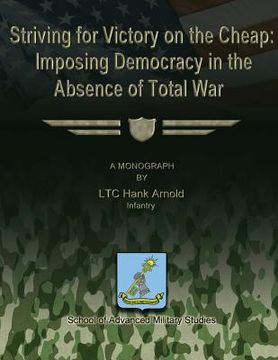Striving for Victory on the Cheap: Imposing Democracy in the Absence of Total War (en Inglés)
Reseña del libro "Striving for Victory on the Cheap: Imposing Democracy in the Absence of Total War (en Inglés)"
Can the United States successfully impose democracy by force without resorting to the same level of total warfare it waged on Germany and Japan in the Second World War? The hypothesis for this research is that the U.S. can successfully force democracy on an undemocratic state without resorting to total war, but it can only do so through a comprehensive plan that includes the coordinated and integrated application of all instruments of national power and influence. This is an important question for operational and strategic planners and policy makers, because the United States has embarked on a series of actions since the Second World War to impose democracy by force, but has been reluctant to wage total war in order to achieve that goal. The evaluation criteria for this research are drawn from two main sources. The first source is Dr. Eva Bellin's article in Political Science Quarterly (Volume 119, Number 4, 2004-2005) titled "The Iraqi Intervention and Democracy in Comparative historical Perspective." In that article, she posits seven factors that significantly contributed to the success the U.S. experienced with Japan and Germany: Economic development, ethnic homogeneity, effective state institutions, prior experience with meaningful democracy, leaders of national stature capable of sponsoring the democratic process, the psychology of utter defeat as a result of total war, and the level of commitment by the U.S. in terms of money, manpower and diplomacy. The second source for the evaluation criteria is the Center for Strategic and International Studies'(CSIS) Winning The Peace: An American Strategy for Post conflict Reconstruction, edited by Robert C. Orr, in which Orr posits four "pillars" for successful post conflict reconstruction: security, governance and participation, social and economic well-being, justice and reconciliation.2 Combining elements of the two sources produces the evaluation criteria for this monograph. Those elements are security, the level of U.S. commitment, governance and participation, social and economic wellbeing, justice and reconciliation, and the psychology of defeat. The research studies U.S. efforts in post World War II Germany and Japan, Grenada in 1983, Panama in 1989, and the recent operations in Afghanistan and Iraq. The study screens and evaluates each of the case studies against the research criteria. However, the research for this study shows that security is not merely one of several pillars of post-conflict reconstruction. Security is actually the foundation for the post-conflict reconstruction effort upon which all other pillars must anchor in order to have success. All other elements of the evaluation criteria are necessary for success in imposing democracy, but they are not sufficient. Only security is the element that is both necessary and sufficient. The concluding analysis of the case studies during the research finds that the U.S. can impose democracy in the absence of total war, but it can only do so by committing the resources necessary to establish the foundation of a secure post-conflict environment that enables reconstruction and transformation.

